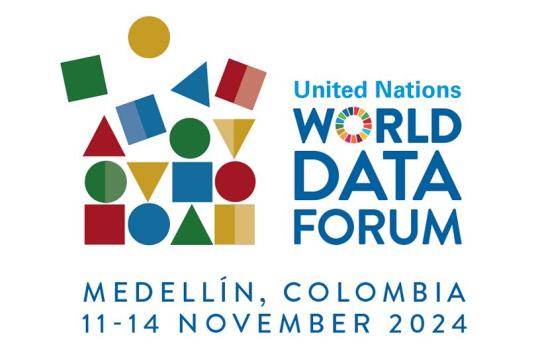Where to Find Open Data Watch at the 2024 UN World Data Forum
by the Open Data Watch Team
26 October 2024
 The United Nations World Data Forum (UNWDF) is back for its fourth edition, and this year, it is set to take place in Medellín, Colombia from November 12-15. The goal of the UNWDF is to spark innovative ideas, foster collaboration, and build partnerships to pave the way for better data in sustainable development. For the first time in its history, a Commit to Data campaign is running alongside the UNWDF.
The United Nations World Data Forum (UNWDF) is back for its fourth edition, and this year, it is set to take place in Medellín, Colombia from November 12-15. The goal of the UNWDF is to spark innovative ideas, foster collaboration, and build partnerships to pave the way for better data in sustainable development. For the first time in its history, a Commit to Data campaign is running alongside the UNWDF.
As highlighted by ODW’s Managing Director and co-chair of the UNWDF Programme Committee, Shaida Badiee, the Forum is unique because it fosters inclusivity, adapts to the evolving data landscape, captures regional energy, and drives real-world commitments. For us, this year is especially remarkable as we are bringing 22 members of the Gender Data Network (GDN) to the Forum, enriching the discussions around gender data and inclusive development.
If you will be attending the Forum in Medellín, we invite you to attend the sessions ODW will be co-hosting and participating in:
Taking Data into our Own Hands: Co-creating the Roadmap to Implement the Copenhagen Framework on Citizen Data
Wednesday, 13 November: 11 AM – 12 PM (GMT-5)
Co-hosts: Collaborative on Citizen Data Steering Committee, Danish Human Rights Institute, Human Rights Council (Greenland), World Federation of the Deaf, UNSD-DESA.
In this session, panelists will highlight the importance of implementing the Copenhagen Framework as they share how various groups are overcoming data gaps by partnering with traditional data sources and taking an active role in data collection. Experiences from initiatives, such as the Leave No One Behind coalition in Malawi, the Alliance for Land, Indigenous and Environmental Defenders (ALLIED), and the World Federation of the Deaf, will provide insights about strategies to ensure inclusivity in data systems.
Enhancing CRVS Systems: Intersectional Approaches and Resource Mobilization for Inclusive and Sustainable Development
Wednesday, 13 November: 3-4 PM (GMT-5)
Co-hosts: Open Data Watch, UNFPA, and Global Health Advocacy Incubator
This session will focus on the importance of Civil Registration and Vital Statistics (CRVS) systems in promoting inclusive societies and improving statistical frameworks. Panelists will discuss the challenges that low- and middle-income countries face with underfunded CRVS systems and low registration rates, highlighting the importance of local investment and integration needs required to ensure no one is left behind. Commitments to CRVS, as part of the UNWDF Commit to Data campaign, will be showcased to emphasize the importance of strengthening these systems through resource mobilization and intersectional approaches.
Peer-to-Peer Exchange: Open Data Frameworks for Better SDG Reporting
Wednesday, 13 November: 3-4 PM (GMT-5)
Co-hosts: Open Data Watch and Open Data Charter (ODC)
This interactive workshop will explore how various data governance models impact the accessibility and transparency of SDG-related data. The presentation will be focused on SDGs 3, 5, and 13, with ODW and ODC discussing country transparency policies and country Voluntary National Review (VNR) practices. Following the presentation, participants will engage in breakout discussions on key topics, such as the relationship between SDG reporting tools and open data policies, the integration of national development agendas with the SDGs, and the country-level operationalization of international transparency commitments.
Measure for Measure: Leveraging Gender Data Capacity Measures in Practice
Thursday, 14 November: 1:30-2:30 PM (GMT-5)
Co-hosts: Open Data Watch, UN WOMEN, PARIS21, and World Bank
This session will highlight existing mechanisms used to measure national statistical and gender data capacity, including the Gender Data Compass (ODW), the forthcoming Gender Data Outlook (UN Women and PARIS21), and the Gender Statistical Performance Indicators (World Bank). The discussion will be centered on how these measures can support statistical systems to develop a compressive understanding of gender data capacity and its impact in improving policymaking. Participants will also have a chance to hear about case studies and participate in an interactive problem-solving exercise.
Getting to the Finish Line: Strengthening Country Capacity to Translate Gender Data into Use and Impact by 2030
Thursday, 14 November: 2:45-3:45 PM (GMT-5)
Co-hosts: Open Data Watch, World Bank, Data2X, and UN Women.
This session will emphasize the role of gender data in reducing disparities and promoting gender equality. Despite its importance in evidence-based policymaking, gender data faces persistent gaps and is still underutilized. Participants will learn about the challenges national statistics offices face when integrating gender data into their systems and innovative solutions that can help countries improve data collection, analysis, use and impact. In “getting to the finish line,” we will also highlight a gender data commitment part of the UNWDF Commit to Data campaign, which aims to advance gender data within the broader data ecosystem.
UNWDF 2024: Catalyzing Commitments for Sustainable Development Data
Friday, 15 November: 2:30-3:30 PM (GMT-5)
Co-hosts: Open Data Watch and PARIS21
This interactive session highlights the Commit to Data campaign, which builds on previous UNWDF outcomes, like the Cape Town Global Action Plan, guiding sustainable development data initiatives until 2030. There, commitments will be on display via a poster exhibit allowing participants to network and explore other commitments in the space. The session will also focus on how to maintain momentum of the Forum in Colombia through 2026 to the next Forum in Saudi Arabi.







